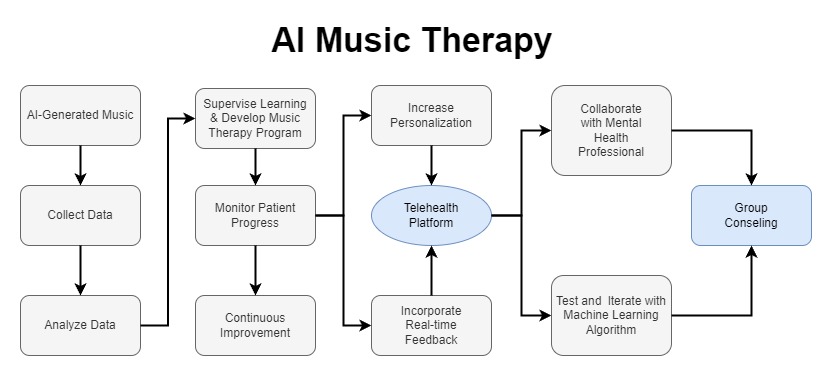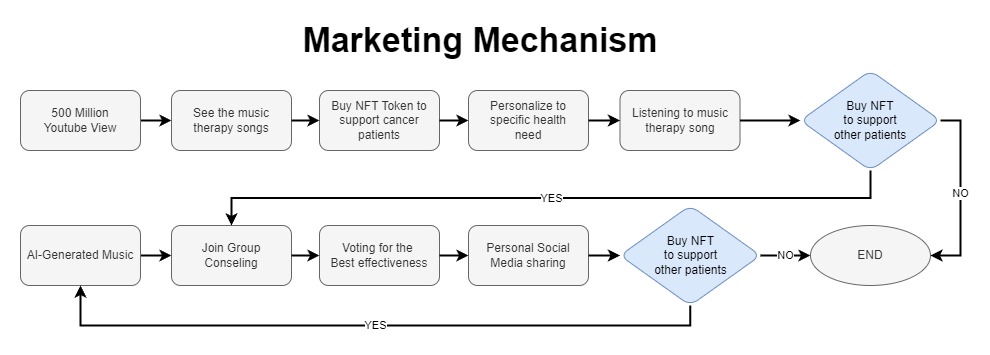MDMusic.ai
Statistically, at least 1 in 8 people have at least one mental health diagnosis, i.e. anger, depression, anxiety, stress disorder, etc. Music psychotherapy managed by mental health professionals has been studied for years, proven as an effective preventive therapy, saving mental health patients from hospitalizations, which can cost over $100,000 in one admission. Per "The High Cost of Caring for Adults with Serious Mental Illness (SMI) and Its Implications for the Affordable Care Act" by J. Michael McWilliams et al., the average annual cost of care for a person with serious mental illness is approximately $24,000, with hospitalizations accounting for a significant portion of these costs. Actual Data from the CHiR database with 50M+ Medicaid claims data at Arizona State University has shown price can go up to $130,000 USD per year.
We have recent filed with the USPTO a patent-pending technology in Physician-Centric AI Music Therapy for Mental Health with application no. 18/462,376 . Currently, our AI-generated music therapy contents are designed and produced by our subsidiary SOFIN Network, an integrated Web3/AI social media technology, capable of driving over 500 million monthly US views on YouTube and for their music and music videos via a proprietary technology creating trendy AI content, social listening, and server bot. As the number of views are growing in near future via our increasing KOL network, we are expanding the same infrastructure with selected therapeutic content into two more revenue models: (1) Subscription model with music counseling therapy, selling through the major channels, i.e. Spotify, Amazon Music, Apple iTunes, etc.; and (2) Mental health group counseling and other healthcare verticals (i.e. medications, direct contracts with Medicare & Medicaid, etc.) as time evolves. Below are two diagrams illustrating how our MDMusic AI is developed and evolved into mental health therapies.
We architect our MDMusic platform which builds an AI music therapy program for mental health as follows:
Collect data: We first collect data on the symptoms of depression, anxiety, and stress in patients. This can be done through surveys, questionnaires, music listening or other methods.
Analyze data: Once data is collected, we use machine learning algorithms to analyze it and identify patterns and trends. This data analysis can help develop a better understanding of the specific symptoms that are most common in your patient population.
Develop music therapy programs: Based on the data analysis, we develop music therapy programs that target the specific symptoms identified, thus creating playlists of music that have been shown to be effective in reducing anxiety, or depression, or developing customized music therapy sessions (no more than 2 hours play songs) based on individual patient needs.
Monitor patient progress: We use machine learning algorithms to monitor patient progress over time and adjust the music therapy programs as needed based on patient feedback and outcomes.
Continuous improvement: We continuously collect and analyze data to improve the effectiveness of the music therapy programs, and use machine learning algorithms to identify new patterns and trends that can inform future program development.

Our MDMusic platform can be applied for depression, anxiety, and stress reduction using this protocol for group psychotherapy:
Increase personalization: We use machine learning algorithms to personalize the music therapy programs for individual patients based on their specific symptoms, preferences, and needs.
Incorporate real-time feedback: We develop ways to collect real-time feedback from patients during music therapy sessions, and use this feedback to adjust our program on the fly.
Collaborate with mental health professionals: We work with mental health professionals to ensure that the music therapy programs are aligned with evidence-based treatments and best practices for treating depression, anxiety, and stress.
Test and iterate: We continuously test and iterate the music therapy programs, using machine learning algorithms to analyze data and identify areas for improvement.

With our experience as a management services organization (MSO) and partnership with mental health professionals nationally, we can help initiate group counseling and other verticals in every state, using our telehealth platform and BPOs to hire doctors nationally. We provide free music therapy for patients to listen to music therapy via YouTube, who are then able to attend our group counseling sessions when they have anxiety and depression. The same can be done through Spotify and other channels.


